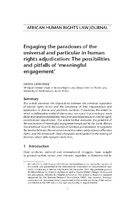| dc.contributor.author | Sandra, Liebenberg | |
| dc.date.accessioned | 2019-10-07T09:37:52Z | |
| dc.date.available | 2019-10-07T09:37:52Z | |
| dc.date.issued | 2012 | |
| dc.identifier.citation | Liebenberg, S. 2012. Engaging the paradoxes of the universal and particular in human rights adjudication: The possibilities and pitfalls of ‘meaningful engagement’. African Human Rights Law Journal. 12, 1-29 | en_US |
| dc.identifier.uri | http://hdl.handle.net/10566/4982 | |
| dc.description.abstract | This article examines the disjunctures between the universal aspiration of human rights norms and the complexity of their interpretation and
application in diverse and pluralistic contexts. It examines the extent to which a deliberative model of democracy can assist in promoting a more dialectical relationship between the universal and particular in human rights constitutional adjudication. The article further evaluates the potential of the mechanism of meaningful engagement employed by the South African Constitutional Court in the context of evictions jurisprudence to negotiate the tension between the universal normative values and purposes of human rights, and the democratic ideal of popular participation in the making of decisions which affect people’s daily lives. | en_US |
| dc.description.sponsorship | This article is based on research supported by the National Research Foundation (NRF) | en_US |
| dc.language.iso | en | en_US |
| dc.publisher | African Human Rights Law Journal | en_US |
| dc.subject | Meaningful engagement | en_US |
| dc.subject | Human rights adjudication | en_US |
| dc.subject | Deliberative democratic paradigm | en_US |
| dc.subject | South Africa | en_US |
| dc.subject | Constitutional adjudication | en_US |
| dc.title | Engaging the paradoxes of the universal and particular in human rights adjudication: The possibilities and pitfalls of ‘meaningful engagement’ | en_US |
| dc.type | Article | en_US |

